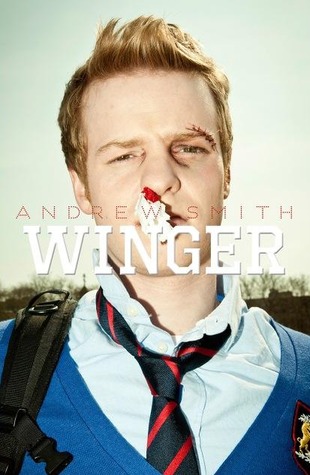Winger by Andrew Smith, 439 pages
This
book is an interesting study. It's an interesting study in narrative,
and how we often root for the protagonist of a story simply because
he's the protagonist (and in this case, because the book's written in
first person), and not necessarily because they're worth rooting for.
Let's be honest: for 2/3 of the book, Winger, the main character here,
is a largely unrepentant turd who typically thinks, feels, and acts more with his libido than his brain. It's
easy to jump to the argument, "sure he makes some mistakes, but at
heart, Winger's a good guy!" But is he? Annie is touted as his best
friend, but apart from her laughing at his usually-crude jokes, the
relationship seems rather one-sided. She seems to legitimately care
about him and his well-being, but 9 times out of 10, his mind is more
occupied with how hot she is and how jealous he gets at her talking with
other guys than it is with anything remotely friend-like. He's routinely
a hypocrite, acknowledges he's a hypocrite, and ignores that knowledge
so he can keep being a hypocrite. He lashes out at his friends, plays
horrible pranks on his enemies, and for the most part, shows no remorse
for any of it.
The study goes further though. The story itself is
largely about his need to grow out of that mindset - about how, while
Winger thinks of "growing up" as getting a few inches taller and having
to shave off his first chin hair, it's really about realizing that love
needs to go beyond physical attraction, that education needs to go
beyond just mindlessly vomiting back what your teacher tells you, and
that friendship needs to go beyond surface-level screwing around.
The
question becomes: does the book sell that? And that's a question I have
difficulty answering. I'd tend towards "yes," but at the same time, the
book sometimes feels manipulative. If this book was written from JP's
perspective (one of Winger's friends), it could probably be titled "Bad
things happen to a relatively decent guy." I just don't know. I'm not
sure if I'm rooting for Winger because I believe he's a good person and I
want him to learn and grow and win in the end, or if I root for him
because I'm as messed up as he is and I associate with some of his worst
elements. I don't know if this books an indictment of juvenile thinking
or a celebration of it.
I do know this much: Winger is not the most likable character in the story, and the character who is
the most likable makes this novel what it is - powerful. Despite my
confusion about much of the book, by the end it's hard to argue that. It
is powerful.
This blog is the home of the St. Louis Public Library team for the Missouri Book Challenge. The Missouri Book Challenge is a friendly competition between libraries around the state to see which library can read and blog about the most books each year. At the library level, the St. Louis Public Library book challenge blog is a monthly competition among SLPL staff members and branches. For the official Missouri Book Challenge description see: http://mobookchallenge.blogspot.com/p/about-challenge.h

No comments:
Post a Comment